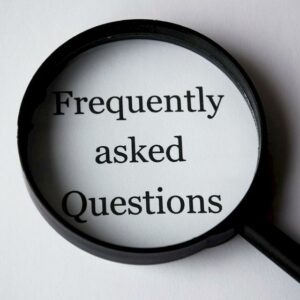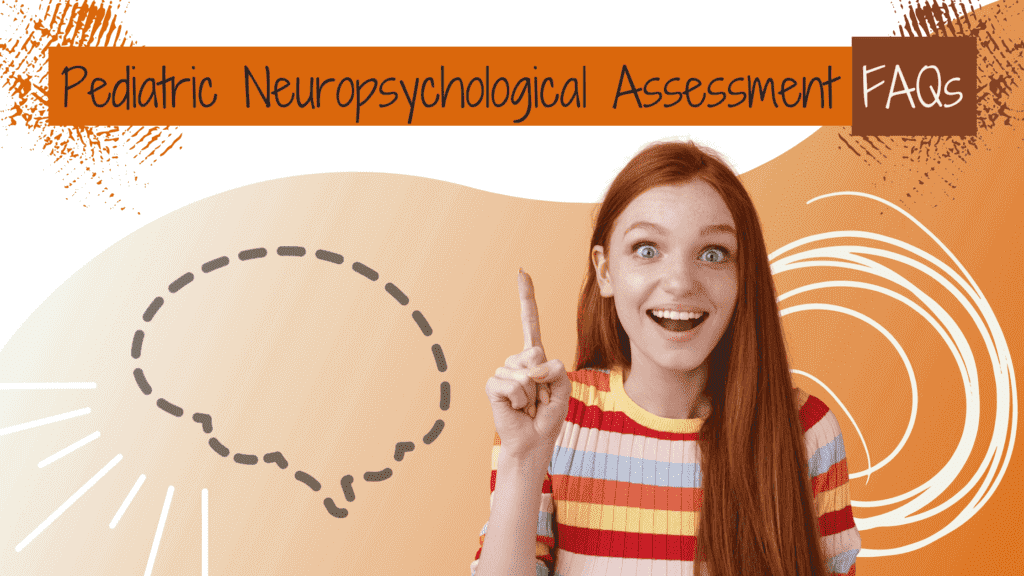
12 Aug Pediatric Neuropsychological Assessment FAQs
Pediatric Neuropsychological Assessment FAQs
Pediatric Neuropsychological Assessment FAQs:
What is clinical neuropsychology, and what does it entail?
Clinical neuropsychology refers to the sub-field of psychology dedicated to understanding brain-behavior relationships. Specifically, studying and observing the architecture of the brain as it develops over time or how it is affected by certain sudden onset conditions. For example, a person experiencing head trauma from an accident may suddenly deal with problems when paying attention, recalling things, or solving issues.
When professionals understand how the brain works and connect it to how people think and act, they can use it to diagnose and treat brain neurodevelopmental differences.
Pediatric neuropsychology is a field of study that focuses on the cognition, learning, and behavior of younger individuals (children and teens).
A pediatric neuropsychologist has a Ph.D. in clinical psychology and is specifically trained to understand how neurodevelopment, brain anatomy, and brain systems affect thinking, learning, and behavior.
A pediatric neuropsychologist uses standardized tests to assess cognitive abilities such as attention, executive functioning, memory, visuospatial processing, and language.
To conclude, assess clinical diagnoses, and make suggestions, a pediatric neuropsychologist uses the numerical findings of standardized tests in conjunction with parent/teacher reports, a child’s behavioral presentation, and a thorough background check of the familial history.
To evaluate progress and manage expectations, pediatric neuropsychologists frequently collaborate with a child’s doctors, therapists, and educators. They often confer with teachers and school administrators to assist in providing essential educational or academic adjustments.
To build a thorough treatment plan, a pediatric neuropsychologist typically helps families connect with the proper therapists (e.g., psychotherapists, speech/language therapists, occupational therapists).
Pediatric neuropsychologists practice in a variety of settings. Many work in private practice on their own. Others work in a hospital, medical school, or specialized health clinic. Some neuropsychologists in hospitals and universities frequently split their time between clinical care and research.
⏩Need A Neuropsychology Referral?⏪
How long does it take to have a neuropsychological evaluation?

A full examination usually takes one to three days of testing. One day of testing can take up to eight hours, depending on the intricacy of the issues and the patient’s health. The neuropsychologist aims to elicit the highest possible performance from the patient under ideal conditions.
What can I learn about my child from the findings of a neuropsychological evaluation?
The neuropsychologist can construct a profile of your child’s relative strengths and weaknesses by comparing your child’s test scores to those of children of comparable ages. The outcomes benefit people who are involved in your child’s care in a variety of ways.
Testing can tell you why your child is experiencing difficulties in school. It can help identify an attention problem, a language disorder, or a reading disability, which can cause literacy difficulties for a student.
The results of the testing will also guide the neuropsychologist’s interventional recommendations. The findings can show if your child needs therapy, educational modifications, and learning techniques to help assist your child with education and daily life.
Doctors can detect epilepsy, attention deficit hyperactivity disorder (ADHD), dyslexia, and anxiety through testing. They can also do testing to establish a baseline and measure the outcome of therapy on the child’s growth over time.
Specific patterns of strengths and weaknesses emerge from various developmental illnesses. These ability profiles can aid in identifying a child’s problem and the brain regions implicated.
Furthermore, testing can assist in distinguishing between an attention deficit and depression. It can establish whether a language delay is causing difficulties with comprehension or expressing language, socialization, or literacy.
Your neuropsychologist and primary care physician might collaborate if additional medical testing is needed, such as brain imaging and blood testing.
Most importantly, testing gives parents and teachers a better picture of their child’s behavior and learning at school, at home, and in the community. Teachers, therapists, and tutors can use the results to help your child reach their full potential.
What is the difference between a neuropsychological evaluation and a school evaluation?
One of the biggest differences is the qualifications of the evaluator. Neuropsychologists have more in-depth training than psychologists who work at schools. However, some of the tests used by pediatric neuropsychologists and school psychologists overlap.
On the other hand, school evaluations focus on determining if a child has difficulty with basic academic abilities, like reading, spelling, or math, and offer a more limited range of diagnoses.
Pediatric neuropsychologists dive deeper by having access to a broader range of tests and taking a closer look at memory, attention, and problem-solving.
Understanding the breadth of a child’s cognitive strengths and weaknesses will result in stronger findings to help students find the best educational interventions, therapy, and medical care when warranted.
Because neuropsychologists have completed clinical psychology training, they may also diagnose emotional issues like depression and anxiety and medical conditions like ADHD.
What is the purpose of a neuropsychological evaluation for adults?
A neuropsychological examination identifies patterns of cognitive and behavioral function strengths and weaknesses. An assessment and interpretation of this pattern of strengths and weaknesses can:
- Assist in a differential diagnosis (e.g., to see whether probable mental and behavioral changes are linked to the individual’s motor condition, depression, or another brain-based illness);
- Assist with evaluations before and after functional neurosurgery treatments (e.g., deep brain stimulation) to establish if therapy is appropriate for a certain person and whether the treatment has had any good or negative impacts on mental functions and behavior;
- Establish a benchmark that can be used to measure future evaluations. Your physicians can determine if your functionality has deteriorated due to the illness or whether it has worsened or improved as a result of therapy.
- Identify areas of everyday functioning (for example, money management) where the patient may require support. Likewise, it can confirm one’s need for therapy or rehabilitation. Will particular cognitive or behavioral therapies, occupational therapy, or medication benefit the individual?
Is it possible to prepare for a neuropsychological assessment?

Although these are not exams that an individual can prepare for, there are a few things that they can do to help with the evaluation:
- A current list of ALL drugs and dosages should be brought by the patient (because the medication can frequently change for some persons, it is vital to make sure the list is up to date).
- If the patient is having trouble sharing information regarding their medical history, having a family member or friend join them is beneficial (for at least part of the clinical interview).
- It will be beneficial if the patient can give records of past neurodiagnostic testing (e.g., brain scans such as CT or MRI scans) and findings from earlier neuropsychological examinations if conducted at another hospital or institution.
The neuropsychologist’s purpose is to obtain the most accurate picture of the patient’s current condition and functioning. Several factors can obstruct this purpose, particularly if the patient is:
- Excessively weary or exhausted or has unpredictable “sleep attacks”;
- They are not inspired to give it their all;
- Has a severe psychological disorder or is emotionally distressed;
- While under the influence of prescription or illegal drugs that impair cognitive function
If the individual anticipates any of these concerns interfering with the examination, they should let the examiner know.
Before the examination, it is important to get a good night’s sleep. Patients are advised not to drink alcohol for at least 24 hours before the examination. Patients who are taking sleep aids or medication should talk to their doctor to see whether it may impair their test performance the next day.
Check out our other blogs:
➡ A Parent’s Guide To Pediatric Neuropsychological Assessment
➡ What Is A Neuropsychological Evaluation And Its Purpose?
➡ How are Executive Functioning and Neuropsychology Related?
Do you know a student who needs a neuropsychological evaluation?
Chat with Themba Tutors Today!
We will connect you to some of the best neuropsychologists in the New York City metro area!
Call: (917) 382-8641, Text: (833) 565-2370
Email: [email protected]
(We respond to email right away!)
References:
Pediatric Neuropsychological Evaluations FAQs. (October 1, 2012.). Retrieved from: http://www.lindsaywhitmanphd.com/pediatric-neuropsychological-evaluations-faqs-child-neuropsych/
Pediatric Neuropsychology – Answers to Frequently Asked Questions. (n.d.). Retrieved from: http://ncnf.org/Pediatric_neuropsychology_FAQ
FREQUENTLY ASKED QUESTIONS (FAQS). (n.d.). Retrieved from: https://prod.psychiatry.medicine.utah.edu/psychiatry/neuropsychological-assessments/faqs
Neuropsychological Evaluation FAQ. (n.d.). Retrieved from: https://www.hopkinsallchildrens.org/Services/Institute-Brain-Protection-Sciences/Programs-and-Services/Center-for-Behavioral-Health/Neuropsychology/Neuropsychological-Evaluation-FAQ
Pediatric Neuropsychology – Answers to Frequently Asked Questions. (n.d.). Retrieved from: https://www.wwmedgroup.com/wp-content/uploads/2016/01/neuropsychology_faq_pediatric.pdf
Craig Selinger
Latest posts by Craig Selinger (see all)
- Psychotherapy and Support Services at Cope With School NYC - April 12, 2024
- NYC Parents of Teens Support Group - April 8, 2024
- Here I Am, I Am Me: An Illustrated Guide to Mental Health - April 4, 2024



No Comments